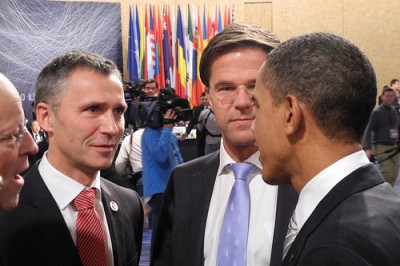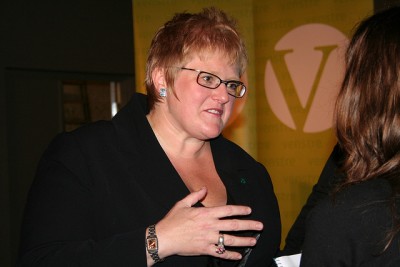Former Prime Minister Jens Stoltenberg, seen as a likely target of the US surveillance reported by newspaper Dagbladet on Tuesday, says he wants to “get all the facts on the table” because he “wasn’t aware” that the US had registered 33 million mobile phone conversations in Norway in the space of just one month while he was premier. The head of Norway’s Liberal party (Venstre) called the reported surveillance “quite shocking.”

Venstre leader Trine Skei Grande noted that according to Dagbladet’s story, not only the politicians were being monitored “but all of us Norwegians.” She criticized the US for “treating all Norwegian citizens as potential terrorists.”
Stoltenberg, who was still prime minister during the period of surveillance reported by Dagbladet last winter, told Norwegian Broadcasting (NRK) that the alleged extent of the US surveillance underscores “how important it is to get clarification of what actually has happened.” Stoltenberg, who’s among the many top Norwegian politicians who view the US as Norway’s most important ally, said he can understand US President Barack Obama’s argument that surveillance is an important means of carrying out the fight against terrorism.
“But it’s important that it takes place within the law and regulations,” Stoltenberg said, and when the head of Norwegian military intelligence later dismissed Dagbladet’s story, he said he was aware that the Norwegians were collecting data of their own and sharing it with the US. He told NRK that he didn’t think the US listened in on his conversations but that he was always careful not to discuss sensitive issues on the phone. Dagbladet, which based its surveillance report on classified documents from fugitive Edward Snowden, wrote that the NSA didn’t tap in to the conversations but rather registered who called who, how long they spoke and where the phones were located. It’s been reported earlier that the US has had as many as 35 government leaders under surveillance.

Stoltenberg said that Obama had told him and other Nordic leaders during a meeting in September that the US respected laws and regulations in the Scandinavian countries. “That was an important theme in the meeting we had with Obama,” Stoltenberg told NRK.
His former government colleague Bård Vegar Solhjell of the Socialist Left party (SV) was tougher in his response, telling Dagbladet that Norway had been assured by US officials that the US did not conduct illegal surveillance of Norwegians and that now seemed to be untrue true.
Consequences for US relations
Solhjell served as both education minister and minister of the environment in Stoltenberg’s Labour-led left-center government coalition. Solhjell also stepped in for the prime minister when Stoltenberg was away, and said the former government “had several rounds” of talks with US officials, “where we thought we got good answers, in conversations from the bureaucratic levels all the way up to Stoltenberg. They said that all intelligence gathering they were involved with was within American law. We were assured that there was no illegal surveillance of Norwegians.”
He said it now appears that “many countries,” not just Norway, were “given clarifications that haven’t proven to be very clarifying.” Solhjell, of the Socialist Left party (SV), said he thinks revelations of the surveillance “will and should” have consequences on relations Norway has with the US. “This is completely unacceptable,” he told Dagbladet.
‘Criminal act’
Norwegian authorities have claimed the surveillance violated Norwegian law and basic human rights. Torstein Olsen, head of Norway’s communications authority (Post- og teletilsynet), called the reported surveillance “frightening” and a possible “criminal act,” because it’s illegal for to register telephone conversations for anyone other than telecommunications companies.
A phone conversation, he said, “is a private act that no one else should have access to. The phone companies aren’t allowed to share the information with others, although police can order access. He said it was important to find out how the registration of the more than 33 million phone calls occurred. Depending on the answer, both the Norwegian police intelligence unit PST, his agency PT, and the security authority NSM may be affected or involved.
“We in PT aren’t aware of such data being registered,” Olsen told Dagbladet. “We evaluate the fact before contacting the phone operators.”
Phone operator deny granting access
Both Telenor and Netcom, Norway’s leading mobile phone operators, denied they had shared any such data. Both deny that the US’ National Security Agency or any US authorities had been granted legal access to information about Norwegians’ phone use.
“If Dagbladet’s report is correct, we see this as a serious breach of our customers’ right to privacy,” Øyvind Vederhus of Netcom told Dagbladet. “At the same time, we don’t have enough information to say which methods NSA may have used.”
Hanna Tangen Nilsen, security director at Telenor, also denied that Telenor had granted any legal access to NSA. She said that Telenor has a legal obligation to release information on customer traffic to the police, but the police must apply for to PT to release Telenor from its own confidentiality agreements with customers.
Any communications control, the police or PST must gain a court order. Nilsen said she wasn’t aware that US intelligence agents had gathered information on traffic from its network.
newsinenglish.no/Nina Berglund

